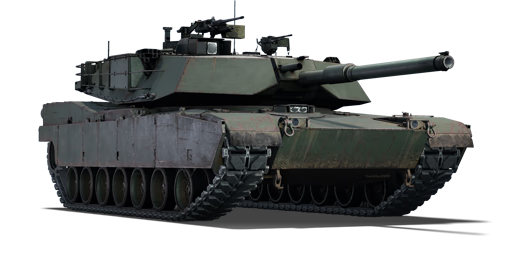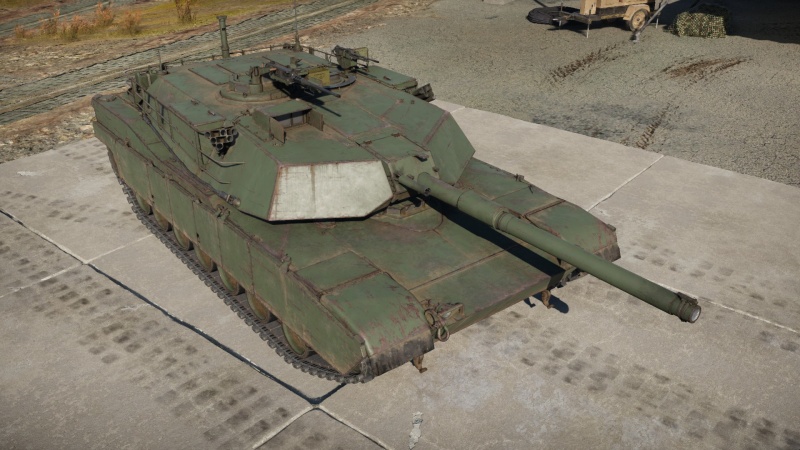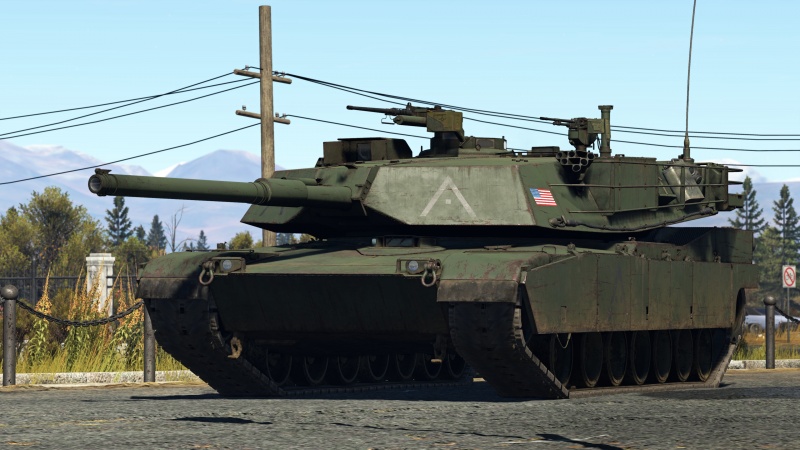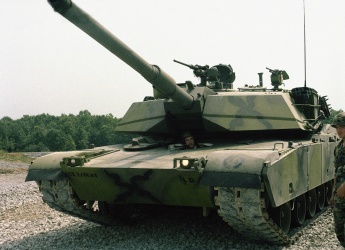IPM1
| This page is about the American medium tank IPM1. For other vehicles of the family, see M1 Abrams (Family). For other uses of the designation, see M1 (Disambiguation). |
Contents
Description
As the M1 Abrams entered service and work began on the M1E1 model with a 120 mm gun, there was a need to synergize the original M1 Abrams' specification with new features implemented into the M1E1. This became the Improved Performance project and saw the turret improvements to the M1E1 implemented into the M1, which improved the overall turret armour. There were other miscellaneous changes for crew comfort such as a rear turret bustle rack for stowages and a cut down rear side skirt for better access to the sprocket wheel. The overall tank designation became known as the IPM1, and 894 units were produced between 1984 and 1986. The IPM1 did not see combat in its configuration, though it was involved in the 1987 Canadian Army Trophy competition and was deployed in Operation Desert Shield before being replaced by the M1A1 tank.
Introduced in Update 1.81 "The Valkyries", IPM1 features improved composite protection in the turret cheeks. This enables a more aggressive gameplay as the turret could withstand more kinetic and shaped-charge munitions than the original version. It can also be equipped with the M900 APFSDS round, which can more easily penetrate enemy tank armour. That said, the IPM1's hull armour did not see any improvement and the large turret ring area remains a significant weakpoint, so players should keep these frontal weak points in mind even when facing weaker opponents.
General info
Survivability and armour
The IPM1 maintains the protective measures and survivability of the original M1 Abrams, with the exception of a minor increase in the levels of composite protection. The result is a notable improvement in chemical protection and a minor improvement in kinetic protection. As with its predecessor, the turret cheeks and UFP are quite effective at deflecting ATGMs and HEAT rounds with only a few exceptions (such as the ADATS' 900 mm penetration missiles). Despite the improved protection, the IPM1 is still vulnerable to turret ring, gun mantlet and lower front plate shots, and particularly powerful kinetic rounds through the turret cheeks.
The Abrams' survivability comes not from armour, but rather from the spread-out crew members and critical components, and blowout panel protecting the crew from ammunition detonation. Often this results in enemies needing to make the choice of either disabling the vehicle's mobility or its offensive ability with their initial round; allowing the Abrams either to escape further damage or fire back.
Rounds that penetrate the rear panel between the turret crew compartment and blowout compartment will negate the blowout protection, causing any potential ammunition detonation to knock the vehicle's crew out as well.
Mobility
| Game Mode | Max Speed (km/h) | Weight (tons) | Engine power (horsepower) | Power-to-weight ratio (hp/ton) | |||
|---|---|---|---|---|---|---|---|
| Forward | Reverse | Stock | Upgraded | Stock | Upgraded | ||
| Arcade | 76 | 43 | 56.8 | 2,058 | 2,898 | 36.23 | 51.02 |
| Realistic | 69 | 39 | 1,343 | 1,519 | 23.64 | 26.74 | |
The IPM1 retains the same engine as the original M1 Abrams with a minor increase (+0.9t) in weight due to the armour improvements. As such, the IPM1 suffers from a minimal reduction in top speed but will still comfortably reach 70km/h on-road. Despite the hugely powerful engine, the vehicle's manoeuvrability suffers prior to the Tracks upgrade being researched; once Tracks have been purchased the IPM1 will perform significantly better in close quarters or in off-road applications.
As with the original Abrams, the IPM1 largely relies on its powerful engine to get it to the battlefield earlier than other vehicles and into advantageous positions.
Modifications and economy
Armaments
Main armament
Like its predecessor, the IPM1 is equipped with a reliable 105 mm M68A1 cannon, and also has access to the same ammunition. The 105 mm cannon is somewhat sub-par relative to the weaponry other top rank vehicles are equipped with, but an experienced tanker can make use of the decent round ballistics and incredibly good reload speeds to quickly despatch targets. It's important to know what the cannon is capable of and where weak spots are on enemy vehicles, particularly when facing more modern vehicles such as the Leopard 2A5 and T-80U.
| 105 mm M68A1 | Turret rotation speed (°/s) | Reloading rate (seconds) | |||||||||||
|---|---|---|---|---|---|---|---|---|---|---|---|---|---|
| Mode | Capacity | Vertical | Horizontal | Stabilizer | Stock | Upgraded | Full | Expert | Aced | Stock | Full | Expert | Aced |
| Arcade | 55 | -10°/+20° | ±180° | Two-plane | 38.1 | 52.7 | 64.0 | 70.8 | 75.3 | 6.50 | 5.75 | 5.30 | 5.00 |
| Realistic | 23.8 | 28.0 | 34.0 | 37.6 | 40.0 | ||||||||
Ammunition
| Penetration statistics | |||||||
|---|---|---|---|---|---|---|---|
| Ammunition | Type of warhead |
Penetration @ 0° Angle of Attack (mm) | |||||
| 10 m | 100 m | 500 m | 1,000 m | 1,500 m | 2,000 m | ||
| M456A2 | HEATFS | 400 | 400 | 400 | 400 | 400 | 400 |
| M393A2 | HESH | 127 | 127 | 127 | 127 | 127 | 127 |
| M833 | APFSDS | 395 | 392 | 387 | 381 | 375 | 369 |
| M900 | APFSDS | 522 | 519 | 513 | 504 | 495 | 486 |
| Shell details | ||||||||||||
|---|---|---|---|---|---|---|---|---|---|---|---|---|
| Ammunition | Type of warhead |
Velocity (m/s) |
Projectile mass (kg) |
Fuse delay (m) |
Fuse sensitivity (mm) |
Explosive mass (TNT equivalent) (kg) |
Ricochet | |||||
| 0% | 50% | 100% | ||||||||||
| M456A2 | HEATFS | 1,174 | 10.5 | 0.05 | 0.1 | 1.27 | 65° | 72° | 77° | |||
| M393A2 | HESH | 732 | 11.2 | 0.1 | 4 | 4.31 | 73° | 77° | 80° | |||
| M833 | APFSDS | 1,485 | 3.7 | - | - | - | 78° | 80° | 81° | |||
| M900 | APFSDS | 1,505 | 3.85 | - | - | - | 78° | 80° | 81° | |||
| Smoke shell characteristics | ||||||
|---|---|---|---|---|---|---|
| Ammunition | Velocity (m/s) |
Projectile mass (kg) |
Screen radius (m) |
Screen deploy time (s) |
Screen hold time (s) |
Explosive mass (TNT equivalent) (g) |
| M416 | 732 | 11.6 | 16 | 5 | 25 | 50 |
Ammo racks
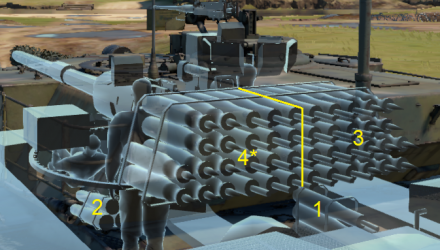
| Full ammo |
1st rack empty |
2nd rack empty |
3rd rack empty |
4th rack empty |
Visual discrepancy |
|---|---|---|---|---|---|
| 55 | 48 (+7) | 45 (+10) | 23 (+32) | 1 (+54) | No |
Notes:
- Blowout rack only: 45 (+10) shells.
Machine guns
The IPM1 is equipped with no less than three machine guns - while most often these are only valuable for clearing obstacles or tagging enemy vehicles, on occasion they might prove valuable dealing with close air support or nearby helicopters, as well as some light vehicles.
Additionally, due to the barrage of rounds produced when all three machine guns are fired simultaneously, they can sometimes be used to obstruct an enemy vehicle's gun sight simply by shooting their main gun (AB/RB) or their optics (SB)
| 12.7 mm M2HB | ||||
|---|---|---|---|---|
| Mount | Capacity (Belt) | Fire rate | Vertical | Horizontal |
| Commander's cupola | 1,000 (200) | 577 | -9°/+65° | -160°/+180° |
| 7.62 mm M240 | ||||
|---|---|---|---|---|
| Mount | Capacity (Belt) | Fire rate | Vertical | Horizontal |
| Loader's cupola | 1,400 (200) | 941 | -9°/+65° | -77°/+135° |
| Coaxial | 10,000 (200) | 941 | N/A | N/A |
Usage in battles
The IPM1 should primarily rely on its speed and reload time to quickly despatch enemies and move back into cover. Where possible, make flanking manoeuvres or use the Abrams' mobility to get into forward positions with the intention to catch unsuspecting targets off. Be aware, however, that the Abrams is only marginally faster than vehicles like the Leopard 2K and T-80U.
When forced into open or ranged engagements, use cover to protect your hull; while the turret may provide insufficient protection keeping the hull safe will often allow you to move back into cover if hit or damaged and repair or relocate, rather than losing your mobility and ability to escape.
Pros and cons
Pros:
- Composite armour in turret cheeks and UFP are capable of stopping all but the most powerful chemical rounds and ATGMs
- Has a very fast reload, 6.5 seconds stock down to 5.0 seconds aced
- Very powerful engine, high top speed and good acceleration characteristics
- Extremely good reverse speed
- Fast turret traverse
- Extremely fast gun elevation/depression
- Well spread crew and critical components result in good survivability
- Blowout compartment can save crew from some ammunition detonation cases
- Array of machine guns, effective against CAS, nearby helicopters and some light vehicles
Cons:
- Armour provides suboptimal kinetic protection
- The 105 mm APFSDS rounds aren't particularly powerful; may struggle to penetrate some modern targets
- Extra armour reduces top speed and acceleration
- Extremely vulnerable gun mantlet and turret ring
- Turbine engine is extremely loud, often audible from long distance and can be used to discern the direction of the vehicle
- Has the slowest reverse speed of (36km/h RB) out of all Abrams with (41km/h RB).
- Like with most Abrams series tanks, the engine deck is slightly raised, meaning that you will not be able to depress the gun over the rear of the tank.
History
- Development M1
With the cancellation of the MBT-70/XM-803 program in 1971, a new program to research and create prototypes for a main battle tank was created in 1972 known as the Main Battle Tank Task Force (MBTTF) at Fort Knox. General Motors and Chrysler were eventually selected to submit drafts and designs and by the end of 1973 there were scale mock-ups of the XM1 prototypes. The design was featured around the previously used 105 mm M68 gun along with a high powered engine for increased mobility.[1] It was decided to explore new types of composite armour, and the Chobham armour being developing in Britain at the time was examined although it was not used in the XM1 prototypes.[2] The XM1 was tested in 1976, and by the end of the year Chrysler was chosen to create extensive engineering test vehicles.[3]
Testing of the Full Scale Engineering Development (FSED) prototypes took place in 1978 and 1979 with 11 vehicles being produced. By this time the Honeywell AGT-1500 gas turbine engine was installed. After successful modifications and testing, initial production was approved in 1979 for a series of 110 units.[4] Following more testing and finalization, production of the standardized 105 mm Gun Tank, M1 Abrams was approved in 1981, with the production run lasting until January 1985 and over 2,300 vehicles being made.[5]
- Development IPM1
The 105 mm Gun Tank M1, Improved Performance was a modification of the original M1 Abrams tank that was produced between October 1984 through May 1986 with a total of 894 vehicles being produced. The changes made to create the Improved Performance models were taken from the ongoing Block I development program for the M1 Abrams, which would eventually produce the M1A1. Additional NERA armour protection in the turret was added, an upgraded suspension and changes to the transmission gears all added substantial weight and the maximum speed was reduced from 45 to 41.5 mph (72.4 to 67.8 km/h). In addition, more stowage racks were added to the turret, which was elongated to fit the additional composite armour arrays.[6]
Media
- Skins
- Videos
See also
- M1 Abrams - Predecessor without the "Improved Performance" upgrades.
External links
- [Devblog] To Minnesota for the "Abrams"
- Hunnicut, R.P. Abrams: A History of the American Main Battle Tank. Novato: Presidio Press, 1990.
References
| General Dynamics Land Systems (GDLS) | |
|---|---|
| MBTs | IPM1 Abrams · M1A1 · M1A1 HC · M1A2 Abrams · M1A2 SEP |
| Tank destroyers | M1128 Stryker MGS |
| USA medium tanks | |
|---|---|
| M2 | M2 |
| M3 | M3 Lee · ▃Grant I |
| M4 | M4 · Calliope · M4A1 · M4A1 (76) W · M4A2 · M4A2 (76) W · M4A3 (105) · M4A3 (76) W · M4/T26 |
| M26 Pershing | T20 · T25 · M26 · M26 T99 · M26E1 |
| M46/47/48 Patton | M46 · M46 "Tiger" · M47 · M48A1 · T54E1 · T54E2 |
| M60 | M60 · M60A1 (AOS) · M60A1 RISE (P) · M60A2 · M60A3 TTS · M728 CEV · 120S |
| MBT-70 | MBT-70 · XM803 |
| M1 Abrams | XM1 (Chrysler) · XM1 (GM) |
| M1 Abrams · M1 KVT · IPM1 | |
| M1A1 · M1A1 HC · M1A1 Click-Bait | |
| M1A2 Abrams · M1A2 SEP · M1A2 SEP V2 | |
| Other | T95E1 |
| Australia | M1A1 AIM |
| Canada | M4A5 |
| Israel | ▃Magach 3 (ERA) · ▃Merkava Mk.1 · ▃Merkava Mk.2B · ▃Merkava Mk.3D |
| Turkey | M60 AMBT |
- Ground vehicles
- USA ground vehicles
- Seventh rank ground vehicles
- Medium tanks
- Ground vehicles with composite armour
- Ground vehicles with smoke grenades
- Ground vehicles with engine smoke generating system
- Ground vehicles with night vision device
- Ground vehicles with thermal sight
- Ground vehicles with gun stabilizer


